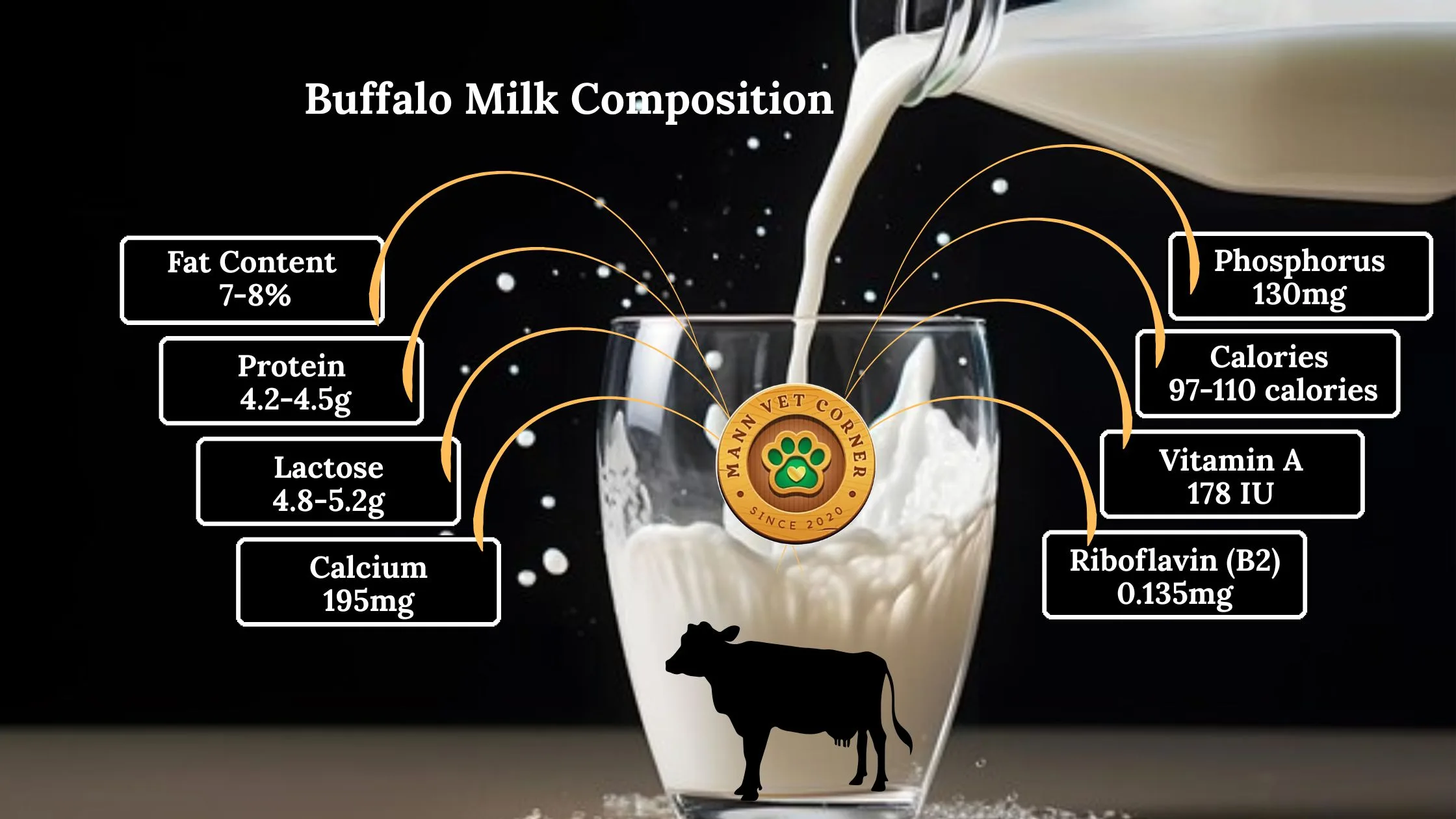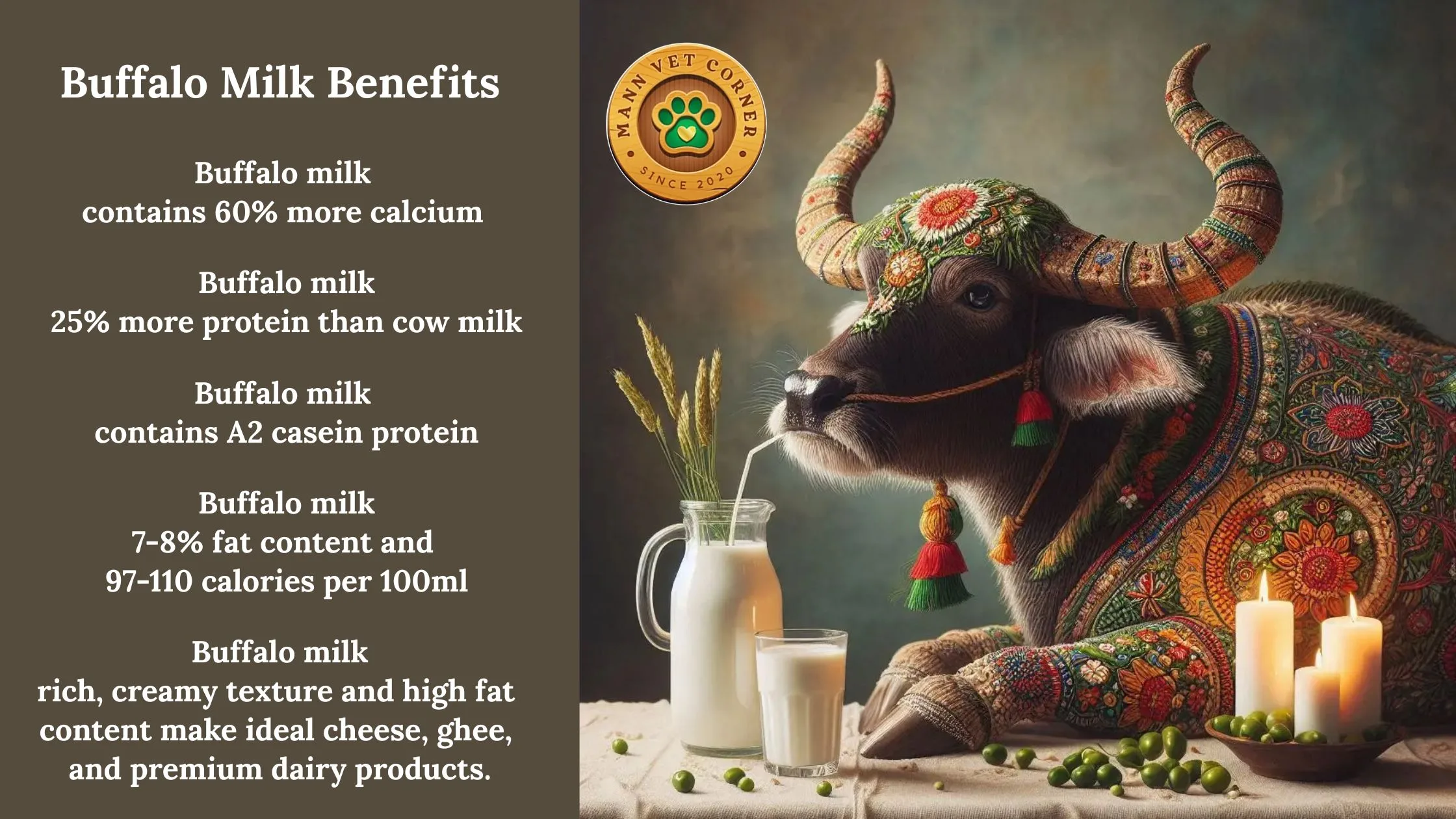Buffalo milk has emerged as a premium dairy alternative, captivating health-conscious consumers worldwide with its rich, creamy texture and exceptional nutritional profile. While cow milk dominates Western markets, buffalo milk has been a dietary staple across Asia and the Mediterranean for centuries, prized for its superior taste and wellness benefits. As buffalo milk trends 2025 continue to spotlight sustainable dairy alternatives, this comprehensive guide explores everything you need to know about this nutrient-dense superfood.
Buffalo Milk Composition: A Nutritional Powerhouse
Understanding buffalo milk composition reveals why this dairy product commands premium prices and growing consumer interest. Buffalo milk contains significantly higher concentrations of essential nutrients compared to conventional dairy alternatives.
Key Nutritional Components (per 100ml):
- Fat Content: 7-8% (nearly double that of cow milk)
- Protein: 4.2-4.5g (25% higher than cow milk)
- Lactose: 4.8-5.2g
- Calcium: 195mg (superior bone health support)
- Phosphorus: 130mg
- Calories: 97-110 calories
- Vitamin A: 178 IU (enhanced eye health)
- Riboflavin (B2): 0.135mg

The higher fat and protein content contribute to buffalo milk’s characteristic rich, creamy consistency, making it ideal for premium dairy products like artisanal cheese and traditional ghee production.
Buffalo Milk Production: Global Trends and Statistics
Buffalo milk production has experienced remarkable growth, with global output reaching approximately 135 million tons annually. India leads worldwide production, accounting for over 80% of global supply, followed by Pakistan, China, and Egypt.
Key Production Insights:
- Primary Breeds: Murrah, Nili-Ravi, and Mediterranean buffalo varieties
- Yield: Average 1,500-2,500 liters per lactation period
- Sustainable buffalo milk production practices are gaining traction, emphasizing environmental responsibility
- Market Growth: 5-7% annual increase in demand, particularly in organic buffalo milk segments
The buffalo milk market has evolved significantly, with many producers now offering organic buffalo milk delivery services to meet growing consumer demand for premium, sustainably-produced dairy products.
Buffalo Milk vs Cow Milk: The Definitive Comparison
The buffalo milk vs cow milk debate centers on nutritional superiority, digestibility, and culinary applications. This comprehensive comparison reveals significant differences:
Nutritional Comparison
Buffalo milk advantages:
- Higher protein content (4.2g vs 3.2g per 100ml)
- Superior calcium levels (195mg vs 120mg)
- Enhanced fat-soluble vitamins (A, D, E, K)
- A2 casein protein – potentially easier to digest than A1 casein found in most cow milk
Cow milk advantages:
- Lower caloric content (suitable for weight management)
- More readily available and affordable
- Established distribution networks
Digestibility and Health Considerations
For individuals experiencing lactose intolerance buffalo milk may present different tolerance levels due to its unique protein structure. However, the buffalo milk vs cow milk nutrition profile suggests buffalo milk provides superior nutritional density, making it an excellent choice for buffalo milk for weight gain and buffalo milk for bone health applications.
Buffalo Milk vs Goat Milk: Alternative Dairy Comparison
Buffalo milk vs goat milk presents interesting contrasts for consumers seeking cow milk alternatives. The following comprehensive comparison table illustrates the key differences:
Comprehensive Milk Comparison Table
| Nutritional Component | Buffalo Milk | Goat Milk | Cow Milk |
|---|---|---|---|
| Fat Content (%) | 7.0-8.0% | 3.5-4.1% | 3.2-3.5% |
| Protein (g/100ml) | 4.2-4.5g | 3.1-3.6g | 3.2-3.4g |
| Lactose (g/100ml) | 4.8-5.2g | 4.1-4.7g | 4.6-4.9g |
| Calories (per 100ml) | 97-110 | 60-79 | 60-65 |
| Calcium (mg/100ml) | 195mg | 134mg | 120mg |
| Phosphorus (mg/100ml) | 130mg | 111mg | 93mg |
| Vitamin A (IU/100ml) | 178 IU | 185 IU | 126 IU |
| Vitamin B12 (mcg/100ml) | 0.36mcg | 0.065mcg | 0.44mcg |
| Iron (mg/100ml) | 0.12mg | 0.05mg | 0.03mg |
| Zinc (mg/100ml) | 0.22mg | 0.30mg | 0.37mg |
| Cholesterol (mg/100ml) | 19mg | 11mg | 14mg |
Key Characteristics Comparison
| Feature | Buffalo Milk | Goat Milk | Cow Milk |
|---|---|---|---|
| Taste Profile | Rich, creamy, sweet | Tangy, distinctive | Mild, familiar |
| Fat Globule Size | Large | Small (easier digestion) | Medium |
| Digestibility | Moderate | High | Moderate |
| Allergenicity | Lower (A2 casein) | Lowest | Higher (A1 casein) |
| Lactose Tolerance | Moderate | Better for sensitive individuals | Standard |
| Shelf Life | Longer (natural preservatives) | Shorter | Standard |
| Color | Whiter (less carotene) | Pure white | Slightly yellow |
| Foam Production | Excellent | Good | Good |
Health Benefits Comparison
| Health Aspect | Buffalo Milk | Goat Milk | Cow Milk |
|---|---|---|---|
| Bone Health | ★★★★★ (Highest calcium) | ★★★★☆ | ★★★☆☆ |
| Weight Management | ★★☆☆☆ (High calories) | ★★★★☆ | ★★★★☆ |
| Muscle Building | ★★★★★ (High protein) | ★★★★☆ | ★★★★☆ |
| Heart Health | ★★★☆☆ (High fat, but CLA) | ★★★★☆ | ★★★☆☆ |
| Digestive Health | ★★★☆☆ | ★★★★★ (Best) | ★★★☆☆ |
| Immune Support | ★★★★☆ (High vitamins) | ★★★★☆ | ★★★☆☆ |
| Child Nutrition | ★★★★★ (Nutrient dense) | ★★★★☆ | ★★★★☆ |
Best Use Cases
Buffalo Milk is ideal for:
- Bone health and development
- Weight gain programs
- Premium dairy product manufacturing
- Traditional cooking and baking
- Individuals seeking nutrient-dense options
Goat Milk is perfect for:
- Lactose-sensitive individuals
- Those with cow milk allergies
- Easy digestion requirements
- Infants and older consumers
- Light, refreshing dairy experiences
Cow Milk works best for:
- Daily nutritional needs
- Budget-conscious consumers
- Weight management goals
- Widespread availability requirements
- Familiar taste preferences
Both buffalo and goat milk offer excellent solutions for consumers experiencing buffalo milk digestion issues or seeking milk allergy solutions beyond conventional dairy options.

Nutritional Benefits of Buffalo Milk: Health and Wellness Impact
The benefits of buffalo milk extend far beyond basic nutrition, offering specific health advantages:
Bone Health and Development
The buffalo milk for bone health benefits stem from its exceptional calcium-phosphorus ratio. With 195mg calcium per 100ml, buffalo milk provides superior bone-building nutrition compared to conventional alternatives, making it ideal for children, athletes, and older adults.
Energy and Metabolism
Is buffalo milk good for health for active individuals? Absolutely. The higher caloric content (97-110 calories per 100ml) and superior protein profile make buffalo milk excellent for buffalo milk for weight gain and muscle development programs.
Heart Health Considerations
Despite high-fat milk concerns, buffalo milk contains beneficial fatty acids, including conjugated linoleic acid (CLA), which may support cardiovascular health when consumed as part of a balanced diet.
Antioxidant Properties
Buffalo milk contains higher levels of vitamin A and E, providing enhanced antioxidant protection against cellular damage and supporting immune system function.
Probiotic Potential
Traditional buffalo milk products like yogurt and kefir offer superior probiotic benefits due to the milk’s rich nutritional profile supporting beneficial bacterial growth.
Managing Potential Concerns
Lactose Intolerance and Buffalo Milk
While buffalo milk contains lactose, some individuals with mild lactose intolerance buffalo milk sensitivity may find it more tolerable due to its different protein structure and processing characteristics.
High-Fat Content Management
For consumers concerned about high-fat milk concerns, buffalo milk can be consumed in smaller quantities or incorporated into balanced dietary patterns focusing on nutrient density rather than volume.
A2 Buffalo Milk Benefits: The Premium Choice
A2 buffalo milk benefits represent the latest trend in premium dairy, focusing on the A2 casein protein naturally found in buffalo milk. This protein variant may offer improved digestibility and reduced inflammation compared to A1 casein proteins common in conventional cow milk.
Conclusion
Buffalo milk stands as a nutritional powerhouse offering superior protein, calcium, and vitamin content compared to conventional dairy alternatives. Whether you’re seeking buffalo milk health benefits for bone development, exploring premium dairy options, or addressing specific dietary concerns, buffalo milk provides an exceptional choice.
The nutritional benefits of buffalo milk make it particularly valuable for individuals prioritizing bone health, muscle development, and overall nutritional density. As sustainable buffalo milk production practices continue evolving and organic buffalo milk delivery becomes more accessible, this premium dairy product is positioned to capture an increasingly larger share of the health-conscious consumer market.
Ready to experience the rich, creamy goodness of buffalo milk? Explore local organic buffalo milk delivery options or visit specialty dairy retailers to discover the exceptional taste and nutritional benefits that have made buffalo milk a treasured dietary staple across cultures for generations.